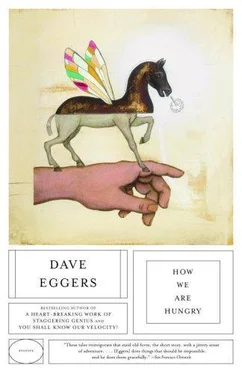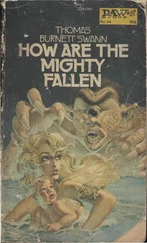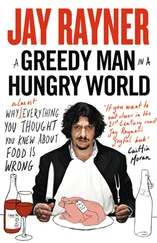Dave Eggers - How We Are Hungry
Здесь есть возможность читать онлайн «Dave Eggers - How We Are Hungry» весь текст электронной книги совершенно бесплатно (целиком полную версию без сокращений). В некоторых случаях можно слушать аудио, скачать через торрент в формате fb2 и присутствует краткое содержание. Год выпуска: 2005, Издательство: Vintage Canada, Жанр: Современная проза, на английском языке. Описание произведения, (предисловие) а так же отзывы посетителей доступны на портале библиотеки ЛибКат.
- Название:How We Are Hungry
- Автор:
- Издательство:Vintage Canada
- Жанр:
- Год:2005
- ISBN:нет данных
- Рейтинг книги:3 / 5. Голосов: 1
-
Избранное:Добавить в избранное
- Отзывы:
-
Ваша оценка:
- 60
- 1
- 2
- 3
- 4
- 5
How We Are Hungry: краткое содержание, описание и аннотация
Предлагаем к чтению аннотацию, описание, краткое содержание или предисловие (зависит от того, что написал сам автор книги «How We Are Hungry»). Если вы не нашли необходимую информацию о книге — напишите в комментариях, мы постараемся отыскать её.
A Heartbreaking Work of Staggering Genius
How We Are Hungry — читать онлайн бесплатно полную книгу (весь текст) целиком
Ниже представлен текст книги, разбитый по страницам. Система сохранения места последней прочитанной страницы, позволяет с удобством читать онлайн бесплатно книгу «How We Are Hungry», без необходимости каждый раз заново искать на чём Вы остановились. Поставьте закладку, и сможете в любой момент перейти на страницу, на которой закончили чтение.
Интервал:
Закладка:
When the night went black they realized their lights were too bright. Passing cars thought their high beams were on, and flashed them. They flashed them back, showing them their real brights, and then, to retaliate, the cars would flash theirs again. It happened a hundred times. They hated the implication of their thoughtlessness, and the strain on their eyes was terrible, all the flashing, all that quick bright anger.
The night before, it was windy and restless outside, and Pilar and Hand had recently fallen asleep and were still lying front to back, Hand’s knees behind Pilar’s knees. There was a loud thump. Hand sat up and when Pilar moved to investigate, he gestured her to stay in bed. She did because she wanted to see what he would do. Was she scared? She was. Hand had made her convinced — more when she thought about it than when she didn’t — that the man from the bank would come, with his gun, and kill Hand and then rape her.
Hand was at the front door of the room when Pilar looked up and found the origin of the sound. It was a hole in the roof, over the bed, where the skylight once was. The wind had pulled the skylight off, and Pilar could see the clear black night through the square in the ceiling. Hand came back to bed and they were friends in bed together, nude. Hand said he liked going to the door to look for invaders and Pilar said she was glad it was a hole in the roof.
ON WANTING TO HAVE AT LEAST THREE WALLS UP BEFORE SHE GETS HOME
HE IS BUILDING a small house in the backyard for when their baby is old enough to use it as a fort or clubhouse or getaway, and he wants to have three walls up before his wife gets home. She is at her mother’s house because her mother has slipped on the ice — a skating party, Christmas-themed — and needs help with preparations for her holiday party, planned before the accident. It’s snowing lightly and the air is cold enough to see. He is working on the small house with a new drill he’s bought that day. It’s a portable drill and he marvels at its efficiency. He wants to prove something to his wife, because he doesn’t build things like this often, and she has implied that she likes it when he does build things, and when he goes biking or plays rugby in the men’s league. She was impressed when he assembled a telescope, a birthday gift, in two hours, when the manual had said it would take four. So when she’s gone during this day, and the air is gray and dense and the snow falls like ash, he works quickly, trying to get the foundation done. Once he’s finished with the foundation, he decides that to impress her — and he wants to impress her in some way every day and wants always to want to impress her — he will need at least three walls up on the house by the time she gets home.
CLIMBING TO THE WINDOW, PRETENDING TO DANCE
THREE HOURS on I-5 so far, straight as a tightrope, and every twenty minutes or so he sees one of those birds. Always near the roadside, on bent fenceposts or hopping in the gray flossy grass, they look like crows but with breasts a militant strain of orange. They come with an eerie regularity, ten already, and they are alone. Fish, approaching thirty and driving eighty, doesn’t know what to call these birds. They are wretched birds.
It’s a merciless drive from San Jose to Bakersfield — you’d think it was Iowa or Texas if you couldn’t, faintly, sense the sea air coming over the western hills. Inland like this, it’s hotter and more humid than Fish, who grew up in Illinois, wants California to be. Heat echoes off the road in liquid waves, cars heave with asthma, and Fish’s penis is sticking to his thigh in a way that seems irrevocable. It’s actually a decent drive for a while — all those velour hills by the dropping of a barn-red sun — but then the road just goes, moaning its way south, and it’s so straight you want to kill it all and chop your goddamned head off.
Fish tells himself, audibly, not for the first time, that he would kill his cousin Adam if he had the chance and could get away with it. As children, he and Adam were made to think of each other as brothers, because their mothers were close and neither of them had a male sibling.
They looked nothing alike.
Adam was an only child, while Fish has a younger sister, Mary, married now and with two sets of twins, all of them freckled and insane — they jump on visitors like dogs. Adam lived in Aurora and Fish lived in Galena, so they saw each other only once a month and in the summers went on uneventful canoe trips in lower Wisconsin, passing in their quiet canoe groups of sharp-toothed kids, poor, wearing bandannas and white rope bracelets.
Fish is driving to see Adam — there goes another one of those black birds, with plumage like a chest exploding— because Adam has tried to kill himself again. This is his seventh attempt, and now Fish knows he should have flown. San Jose, he’s almost sure, has a direct flight to Bakersfield, less than an hour in the air. Piss! Every time he finishes this drive he vows never again, and then two months later he’s here, punching the window, back soaked, left arm sunburned, cursing himself.
Five hours at least, this drive, plenty of time to come up with a plan, something to say. He tries to concentrate on Adam but finds himself constantly adrift and onto other subjects, like food and war. Years ago he thought he could have an effect on Adam’s life, but now he knows he’s a spectator, a parent watching a child’s sporting event, hands twisted into fists, unable to influence the outcome.
Fish passes a huge beef-processing plant, where a hundred thousand cows are kept so close they can’t move their tails enough to swat flies. There is no earth visible below their doomed hides. He rolls up the window, the stench vile, punishing. Those stupid cows, he thinks, born to die, born to be eaten, born to walk in their own feces. Jesus! It smells fetid, bloody and sweet, like human innards, if you could open yourself up and bring it all to your nose and inhale.
Adam doesn’t talk to his mom or to Fish’s parents, and he’s never had a job, none that Fish can recall, which in a way is impressive, how he’s been able to get by for so many years without any sort of legitimate income. There are people who do this, who divert just enough energy and funds and goodwill from those close to them to exist without anyone taking much notice; it’s like stealing cable, but on a larger scale. Fish has given Adam about twenty-two hundred dollars over the years, which he has used frugally — he is clever that way. He’s clever in every way, really, even in surviving so many attempts on his own life. Maybe he’s unkillable, Fish thinks, and he suddenly snorts out loud at the thought.
Fish’s other cousin, Chuck, a tax lawyer in Charlotte with the face of a priest, rose-colored and surprised, says that Adam looks about forty now, though he’s only twenty-eight. The drugs do that, Chuck says. Chuck should know.
Fish hasn’t seen Adam in almost a year and now he’s afraid to. If Adam looks old, it means Fish is old and they’re both old, everyone’s old, and— Damn, another one of those birds. There must be a name for those things.
Adam’s hope, Fish is sure, is to be the shape-shifting mystery spot in the life of his family and friends. The problem is that Fish has never had a fascination with people who try to kill themselves. Maybe if he took more of an interest in the concept, Adam wouldn’t keep trying to prove how intriguing it is. With the resources they required of everyone around him, Adam’s life and his attempts on it were a kind of vacuum, into which he pulled the good air around him, and everyone close to him — took their words and possibility for joy. And yet in most ways Adam is nowhere near as strange, for example, as the guy who delivers Fish’s mail, a man named Kojo.
Читать дальшеИнтервал:
Закладка:
Похожие книги на «How We Are Hungry»
Представляем Вашему вниманию похожие книги на «How We Are Hungry» списком для выбора. Мы отобрали схожую по названию и смыслу литературу в надежде предоставить читателям больше вариантов отыскать новые, интересные, ещё непрочитанные произведения.
Обсуждение, отзывы о книге «How We Are Hungry» и просто собственные мнения читателей. Оставьте ваши комментарии, напишите, что Вы думаете о произведении, его смысле или главных героях. Укажите что конкретно понравилось, а что нет, и почему Вы так считаете.












